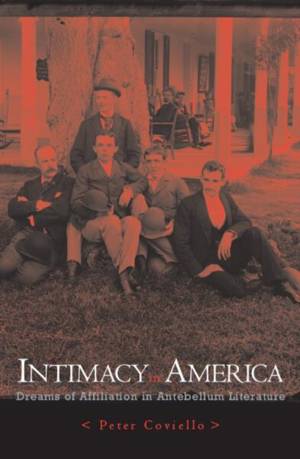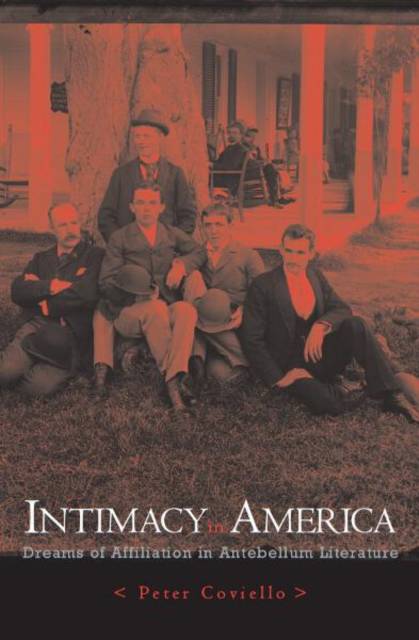
Door een staking bij bpost kan je online bestelling op dit moment iets langer onderweg zijn dan voorzien. Dringend iets nodig? Onze winkels ontvangen jou met open armen!
- Afhalen na 1 uur in een winkel met voorraad
- Gratis thuislevering in België vanaf € 30
- Ruim aanbod met 7 miljoen producten
Door een staking bij bpost kan je online bestelling op dit moment iets langer onderweg zijn dan voorzien. Dringend iets nodig? Onze winkels ontvangen jou met open armen!
- Afhalen na 1 uur in een winkel met voorraad
- Gratis thuislevering in België vanaf € 30
- Ruim aanbod met 7 miljoen producten
Zoeken
Intimacy in America
Dreams of Affiliation in Antebellum Literature
Peter Coviello
Hardcover | Engels
€ 69,95
+ 139 punten
Uitvoering
Omschrijving
Nineteenth-century America was a sprawling new nation unmoored from precedent and the mainstays of European nationalism. In their search for nationality, Americans sought coherence in a feeling of belonging shared among diverse and scattered strangers. Reading seminal works by Thomas Jefferson, Edgar Allan Poe, Herman Melville, Harriet Beecher Stowe, and Walt Whitman, Peter Coviello traces these writers' enthusiasms and their ambivalences about the dream of an intimate nationality, revealing how race and sexuality were used as vehicles for an assumed national coherence. As Coviello shows, race - and especially whiteness - functioned less as a form of identity than as a model of attachment and identification, a language of affiliation. Whiteness created an imaginary fraternity that symbolized citizenship, the ownership of property, and an affinity between strangers, which became entangled in the nation's evolving codes of sexuality. Bringing race theory and "white studies" into dialogue with questions of intimacy and affect, Coviello provides a practical rapprochement between historicist and psychoanalytic methodologies. Intimacy in America gives us a new perspective on the national meanings of race and sex in American literature, as well as on the still-current dream of American-ness as an impassioned relation to far-flung, anonymous others.
Specificaties
Betrokkenen
- Auteur(s):
- Uitgeverij:
Inhoud
- Aantal bladzijden:
- 242
- Taal:
- Engels
Eigenschappen
- Productcode (EAN):
- 9780816643806
- Verschijningsdatum:
- 4/04/2005
- Uitvoering:
- Hardcover
- Formaat:
- Genaaid
- Afmetingen:
- 139 mm x 207 mm
- Gewicht:
- 435 g

Alleen bij Standaard Boekhandel
+ 139 punten op je klantenkaart van Standaard Boekhandel
Beoordelingen
We publiceren alleen reviews die voldoen aan de voorwaarden voor reviews. Bekijk onze voorwaarden voor reviews.











